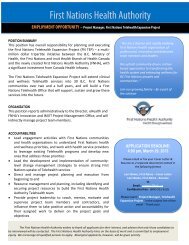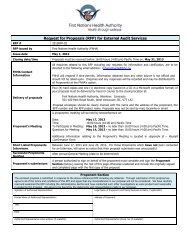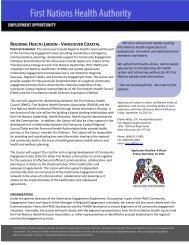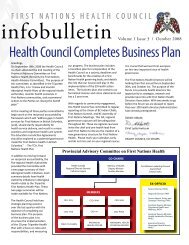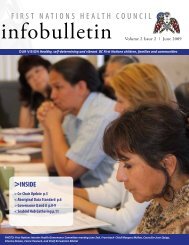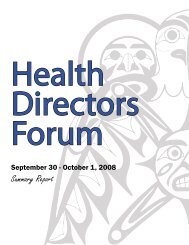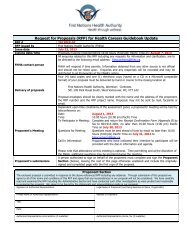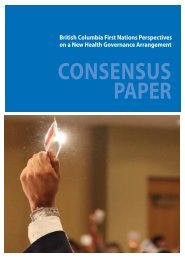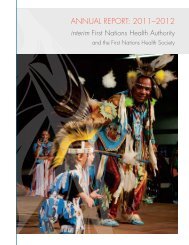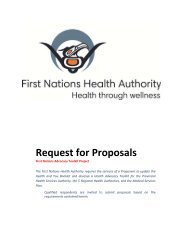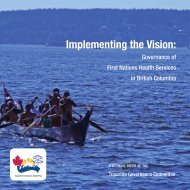unifying and strengthening the response to hiv and aids in ...
unifying and strengthening the response to hiv and aids in ...
unifying and strengthening the response to hiv and aids in ...
- No tags were found...
Create successful ePaper yourself
Turn your PDF publications into a flip-book with our unique Google optimized e-Paper software.
BackgroundThe BC Aborig<strong>in</strong>al HIV/AIDS Task Force was created twelve years ago <strong>to</strong> address <strong>the</strong>disproportionately high rate of HIV <strong>in</strong>fection among BC’s Aborig<strong>in</strong>al people. The impact of riskfac<strong>to</strong>rs such as <strong>in</strong>travenous drug use <strong>and</strong> <strong>the</strong> sex trade, <strong>and</strong> <strong>the</strong> high percentage of Aborig<strong>in</strong>alcases of HIV among Aborig<strong>in</strong>al women were also concerns. The task force’s work raised awarenessof jurisdictional issues as well as <strong>the</strong> need for a prov<strong>in</strong>ce-wide strategy, <strong>and</strong> for an organization<strong>to</strong> build capacity <strong>and</strong> serve as a coord<strong>in</strong>at<strong>in</strong>g body across BC. As a result of <strong>the</strong> task force’swork <strong>the</strong>re has been a growth <strong>in</strong> organizations serv<strong>in</strong>g Aborig<strong>in</strong>al people <strong>and</strong> communitiesaffected by HIV/AIDS, <strong>and</strong> many lives have been saved. The Task Force’s work also resulted <strong>in</strong><strong>the</strong> development of both <strong>the</strong> Red Road Strategy <strong>and</strong> <strong>the</strong> Red Road HIV/AIDS Network <strong>to</strong> overseeimplementation of <strong>the</strong> strategy.In 2005, <strong>the</strong> Renew<strong>in</strong>g our Response conference brought <strong>to</strong>ge<strong>the</strong>r Aborig<strong>in</strong>al <strong>and</strong> non-Aborig<strong>in</strong>alservice providers, health funders <strong>and</strong> policy developers, <strong>and</strong> Aborig<strong>in</strong>al people with HIV/AIDS. The participants reviewed <strong>the</strong> his<strong>to</strong>rical <strong>response</strong> <strong>to</strong> HIV/AIDS <strong>in</strong> Aborig<strong>in</strong>al people <strong>and</strong> <strong>in</strong>particular <strong>the</strong> rise <strong>in</strong> <strong>in</strong>fections among Aborig<strong>in</strong>al people. Twenty-four recommendations based on<strong>the</strong> current challenges <strong>and</strong> past successes resulted from <strong>the</strong> conference.Appreciat<strong>in</strong>g <strong>the</strong> importance of <strong>the</strong>se recommendations, leaders from Aborig<strong>in</strong>al AIDS serviceorganizations formed <strong>the</strong> Renew<strong>in</strong>g Our Response Leaders Team. The team developed strategies<strong>to</strong> address <strong>the</strong> gaps that have led <strong>to</strong> an <strong>in</strong>crease <strong>in</strong> <strong>the</strong> rate of new <strong>in</strong>fections. As well, setbacks<strong>in</strong> halt<strong>in</strong>g <strong>the</strong> spread of HIV –particularly <strong>in</strong> <strong>the</strong> north <strong>and</strong> among Aborig<strong>in</strong>al women – wereaddressed. Funders <strong>and</strong> o<strong>the</strong>rs <strong>in</strong> <strong>the</strong> field were also aware of <strong>the</strong>se challenges.Independent of <strong>the</strong>se developments, <strong>the</strong> federal, prov<strong>in</strong>cial <strong>and</strong> Aborig<strong>in</strong>al governments havebeen work<strong>in</strong>g <strong>to</strong> improve health outcomes for Aborig<strong>in</strong>al people <strong>in</strong> BC through a TransformativeChange Accord <strong>and</strong> <strong>the</strong> Tripartite First Nations Health Plan. A request from Renew<strong>in</strong>g ourResponse for a meet<strong>in</strong>g <strong>to</strong> present its proposed strategic projects <strong>in</strong> November 2007 was greetedpositively. The constructive discussion that followed led <strong>to</strong> a commitment by a wide range ofstakeholders <strong>to</strong> cont<strong>in</strong>ue <strong>to</strong> work <strong>to</strong>ge<strong>the</strong>r on <strong>the</strong> issue of Aborig<strong>in</strong>al HIV/AIDS.A comprehensive <strong>in</strong>ven<strong>to</strong>ry <strong>and</strong> analysis of government funded Aborig<strong>in</strong>al HIV/AIDS services, isunder way. Renew<strong>in</strong>g Our Response <strong>and</strong> government partners met <strong>in</strong> May 2008 <strong>to</strong> identify ways<strong>to</strong> improve <strong>the</strong> <strong>response</strong> of all parties <strong>to</strong> <strong>the</strong> <strong>in</strong>creas<strong>in</strong>g rates of <strong>in</strong>fection. This report, Unify<strong>in</strong>g &Streng<strong>the</strong>n<strong>in</strong>g <strong>the</strong> Response <strong>to</strong> HIV <strong>and</strong> AIDS <strong>in</strong> Aborig<strong>in</strong>al Communities <strong>in</strong> BC, conta<strong>in</strong>s <strong>the</strong> keydecisions <strong>and</strong> discussions that occurred at that meet<strong>in</strong>g. The participants <strong>in</strong>cluded <strong>the</strong> Renew<strong>in</strong>gour Response leaders, representatives from service organizations <strong>and</strong> collaborations, funders,researchers, federal <strong>and</strong> prov<strong>in</strong>cial governments, regional Health Authorities <strong>and</strong> <strong>the</strong> First NationsHealth Council.2 Unify<strong>in</strong>g <strong>the</strong> Response <strong>to</strong> HIV <strong>and</strong> AIDS <strong>in</strong> Aborig<strong>in</strong>al Communities <strong>in</strong> BC F<strong>in</strong>al Report



